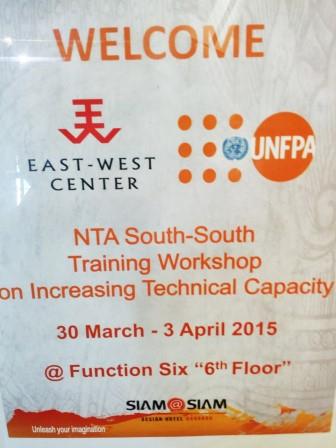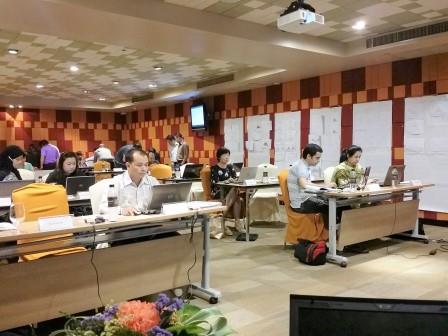Training Workshop on Increasing Technical Capacity: Bangkok, March-April 2015
The workshop aims to share the host country's experience for visiting teams to replicate NTA methodologies for their own countries. The event was hosted by the Office of the National Economics and Social Development Board, Government of Thailand, in Bangkok, Thailand on March 30 to April 3, 2015. It was organized by the East-West Center, and was made possible by funding from the UNFPA Asia and the Pacific Regional Office.


Workshop Agenda
The National Transfer Accounts (NTA) provides a complete accounting by age of how economic resources are produced and consumed, and how each country relies on government programs, family systems, and financial markets to achieve the final distribution of these economic resources. The NTA provides a unique and invaluable framework for investigating how changes in population age structure will influence national development, economic security, generational equity, gender equality, public finances, and many other important public policy issues.
Several countries in Asia, such as India, Pakistan and the Philippines, are experiencing a demographic dividend as their populations become increasingly concentrated in the working ages. For these countries, it is important to examine conditions and policies that affect the size of the dividend and convert the transitory age distribution benefit into a long term boost for rates of economic growth. In other countries in Asia, such as China, Thailand and Vietnam, the working-age population is growing slowly or in decline and the old-age population is growing rapidly. There are concerns about slow economic growth or economic decline due to a large dependent old-age population or low saving rates.
There are two forms of NTA output data – fundamental (core) and advanced. Core data can be produced using the input data and by following the procedures described in the NTA manual . Core training provided should enable production of a NTA flow account. There are several steps to production of a flow account, which are set out in the NTA manual. Even with the manual, however, training is necessary to assist new or less experienced teams in producing a flow account. Advanced NTA data involves applying disaggregation (age, sex, geography, socio-economic status), projection and modeling to core NTA data. Some participants may be beneficiaries of advanced training. EWC has experience in providing core and advanced training. The six NESDB participants will provide the core training, while EWC will provide both the core and the advanced training.
Download full agenda: SSTBKK2015-agenda
Country Presentations
- Bangladesh SSTBKK2015-BGD
- Cambodia SSTBKK2015-KHM
- Indonesia SSTBKK2015-IDN
- Lao PDR SSTBKK2015-LAO
- Malaysia SSTBKK2015-MYS
- Pakistan SSTBKK2015-PAK
